Trump Verdict FAQ: Navigating the Post-Conviction Confusion
From voting to representing America abroad – what would being a felon mean for a second Trump term?
By: GenZ Staff | June 7, 2024 | 735 Words

(Photo by Andrew Lichtenstein/Corbis via Getty Images)
For the first time in American history, a former president – who also happens to be a current candidate – has been convicted on felony charges. This puts the nation in an unprecedented electoral situation and brings up many questions that have never before needed answering. Some are clear-cut; others not so much. From voting to representing America abroad, what will being a felon mean for Donald Trump if he wins a second term?
Can Trump still Run? Can He Pardon Himself?
As we navigate the post-conviction confusion, let’s begin with perhaps the two most straightforward questions to answer: Can Donald Trump still run for president as a convicted felon, and can he pardon himself if he wins? The short answers are yes and no – in this case – respectively.
The US Constitution outlines eligibility requirements for a potential president, and nothing short of an amendment can change that. To mount a campaign for the Oval Office, one need only be a natural-born citizen of the United States who has lived in this nation for the last 14 years and is 35 or older. Since presidential term limits are also built into the Constitution thanks to the 22nd Amendment, no one who has served two terms can run again – but that rule doesn’t apply to Trump, who lost re-election after his first to the current president, Joe Biden. And this particular question isn’t even new. In 1920, former Democrat and founder of the Socialist Party Eugene V. Debs ran for president – and won nearly a million votes – as a convicted felon who was at that time incarcerated on a ten-year prison sentence. He didn’t win, but that’s hardly the point. He was legally allowed to run.
 So, if the former president is constitutionally allowed to reclaim his job, could he simply pardon himself and clear this whole mess up? The answer would be yes if this case had been federal. However, as this was a state case in New York, only the governor of New York can issue a pardon.
So, if the former president is constitutionally allowed to reclaim his job, could he simply pardon himself and clear this whole mess up? The answer would be yes if this case had been federal. However, as this was a state case in New York, only the governor of New York can issue a pardon.
Can He Still Vote?
Another side-effect of a felony conviction is often the loss of voting rights – and, while his single vote wouldn’t make much difference to the outcome, there’s a remarkable irony to a person running for office who can’t even vote for himself. So can he? The answer to this question is a bit more nuanced. Voting laws vary by state. In Florida, where the former president is registered to vote, a convicted felon is allowed to vote as long as they aren’t presently incarcerated and have completed the terms of their sentence – meaning that any fines, restitution, community service, or time on parole or probation must also be completely satisfied.
However, the Sunshine State also defers to the laws of other states when Floridians are convicted of crimes elsewhere. New York only stops felons from voting if they’re in prison on Election Day. So, if Trump is sentenced to anything but prison time – or if his sentence is deferred or delayed for any reason – he should be able to vote, even in Florida.
Can He Visit Countries That Ban Felons?

Donald Trump (Photo by David Dee Delgado/Getty Images)
As a convicted felon, Donald Trump may be refused entry to as many as 38 countries. While many of these countries, like Iran, probably aren’t likely to be found on his travel itinerary, some could be problematic. Japan, Israel, Canada, and the United Kingdom all forbid entry by foreign felons, as do China, Australia, and many more.
George W. Bush famously had to apply for a waiver to enter Canada for an official state visit once because of a 1976 drunk driving charge to which he pled guilty. It was a misdemeanor, not a felony, but still, he had to apply for the waiver. Canada will host the G7 summit in 2025. Would our neighbor to the north deny a sitting US president entry for such an event?
What Happens to the Other Cases If He’s Elected?
As explained by a Nixon-era policy memo, the Justice Department does not indict sitting presidents. This policy and the reason behind it—that doing so would interfere with the president’s ability to perform his duties—would seem applicable from the moment Trump is declared the winner of the general election, should it go that way.
















